I will warn you that this is a post about my profession. It might be boring, but I'll try and make it accessible for everyone. It assumes that humanists identify as a "we"--with some kind of institutional apparatus, no matter how problematic. If you disagree with those semantics, I think you can just skip the article.
In English literature there is a seasonal movement, as young doctorates become restless and seek long-term and short-term employment in a new home. Before, during, and after this process, ink is spilled and fortunes are made. Luminaries shine and failures fall in the field and depart like heroes to the underworld of employment elsewhere. No one is sure what the underworld is. For some it is a paradise, for others a hell. But that's another world and the people living in this one can't be concerned. The pieces written by respectable observers in the Journal of Higher Education or The New York Times or even on the various blogs and facebook walls of the untenured masses (I won't link them here, because they're easy to find and I think I'm talking about another trend), generally make certain assumptions. They assume that our field is bad, that it's hard to find work since the financial crash. That we (the freshly minted doctors) will be poor and abused by the college and that there are too many of us humanists to employ. There are notable exceptions to this trend that point out the spike in Literary Critics of the 70s and 80s is due to the massive amount of cash that Uncle Sam put into the system in order to beat the communists at their own game, but those pieces are rarer. They're also ignored by folks on the ground and the bosses up top the ladder. Before I go any farther, I want to state that I'm writing from a relatively privileged position. I have some decent paying work for the next year or two. I can't start saving for retirement and my country may not have social security, but it's still better than most. Most of my peers have it worse. And because of that, many of us are afraid. This fear infects even those who seem assured of success. This trend of fear, I've discovered, is also true on this side of the Atlantic. We, as a field, are in a defensive posture. We are struggling for a slice of the pie in high capitalist America and mixed capitalist Western Europe. No doubt there are many in positions of power who would give our funding to the dreaded STEM (Science, Technology, Engineering, Mathematics) folks, or even worse, take away educational funding altogether. I don't want to deny that there are attacks made on higher education. I have recently seen the equivalent of chain letters encouraging new PhDs to take value in their calling because they will be poor or have difficulty finding work. It sounds to me like the sort of missionary self-priming that a Puritan or John Brown might say. [Just to be clear, I 'm not dismissing the necessary and uplifting task of taking spreading positivity in the face of difficulty. To some degree, I think many of us have to take solace in our lives of the mind and the cultural cache of intellectual life. I think we need that to get by and be happy]. State schools have, indeed, been ransacked recently. And in particular, the humanities have taken hits on the chain. Even more widespread; Undergraduates have to take on crushing debt to go to school (unless you're in a good private school. Harvard, for example, recently made tuition free to low-income students, and I paid comparatively little to attend Columbia University). Grants are taken away from graduate students. Money is cut from our salaries. But I think it's disingenuous or even negative sloganeering to insist we are being singled out. If this were a different article, now is probably when I would give numbers to you that suggest higher education experienced the same problems that almost every other sector of the world's economy did in the past 10 years. But I want to change the conversation. After all, though I feel capable of doing so, if I wanted to give you numbers, I probably would not be pursuing English literature. That's not to say that I think numbers are useless, but I don't think numbers will help. I think what the humanities have really lost is the propaganda battle in wider culture. We think that if we provide the right numbers, point to employability and the bottom line, that politicians and fundraisers and school bureaucracy will respect us and like us like they used to like Matthew Arnold. I must qualify what I say and tell you that in many cases, meeting this standard of rational dialogue will convince people. But in cases when attacking actually happens, I don't think any degree of fact-checking or reasonable case presenting will work. This is why we need humanists, and why as far as I can look back in history, we have always needed humanists. We need to make arguments. And not just emotional arguments, though that would nice, but sloganeering and pulpit speeches that are worthy of the humanities. I'm not huge into straight lines that go from the past to now, but I do think the modern university owes a debt to a long history of scribes, thinkers, and copyists from various regions of the world. The humanities is a form of the Confucian academy and the Madrasa and the Anarchist Colletive and the Tibetan Monastary and the Technical College and the Monk's Cloister. It is the Kibbutz Yeshiva and a Objectivist meeting and the tiny reading room of 1200 Oxford. It's an ideal that various people have decried as passing, but that proves its value time and time again in various cultural contexts and moments of history. The humanities will wax and wane, but in the long view, it will be there and here. Not because it serves some high spiritual or intellectual ideal, which it occasionally does, but because it is useful and tied up with being a cultural insider or a cultural outsider. It is tied up with the making of meaning. If I were you, I would start to worry about the future of the humanities as a whole when the rich stop sending their children to private schools that employ English Lit PhDs to teach writing, or when they hesitate to pay hundreds of thousands of dollars they don't need to in order to push their child in a liberal arts education that they might not even care about. A huge chunk of the engineers and day traders I went to college with took classes in the core curriculum of the humanities at Columbia, and though they whined and complained and skipped half the reading, I would bet a fair amount that they find extreme value in the things they learned there. Not just in the content of the classics of Western Civilization, but in the techniques of critical and interdisciplinary thinking that they experienced. Does my anecdotal evidence suggest that the humanities is a good thing or a useful thing? Well, useful, for sure. Good? I don't know. That's a question that I doubt anyone can answer with finality. But at the very least, the humanities is necessary. I think that a more accurate question hovering behind much of the tepid commentary is: Will we have as much money as we feel we deserve? That a separate question that relates to the question about the future of the humanities in various ways. But what I really think it speaks to is the current economic and social dispensation of our national governments. And if any field can work through the meaning of value, I think it's English Literature. Though some Marxists might disagree, I think that meaning, like economics, is not a zero sum game. There is space for us if we assume there is space for us. A better question would be, "Why do the objects that currently deserve funding receive that funding?" Despite this question, which could come off as very aggressive, I think it would be better for us poor humanists to try and avoid our eras competitive model and seek reconciliation with those outside our institutions without feeling like we have to justify our very existence or demanding that they justify theirs. There are many paths that many people have already taken in this vein, and many more to be imagined that are better than my best thought on my best day. I do have one suggestion, though. I would suggest that we take advantage of the humanities' great strength and abandon our defensive position to wander the fields of discourse, argument, and even propaganda. Our minds, at least, let us feel free. Whatever I'm doing, I try and be active in the publication of my profession's necessity and its free-wheeling sense that we can talk about anything. In a broad sense, I know that the humanities will be here for a long time in forms that won't seem unfamiliar to viewers from the past. I know humanists can work with a broad range of ideologies and positions, and I know we can have a positive impact. But I think doing so requires us to maintain our long view, in spite of the intense injustices we feel in our hearts and that we see in the world. Many of these problems are so massive that they can only be addressed by the frustratingly slow work of dozens of years. But that's our work and our distant goal. 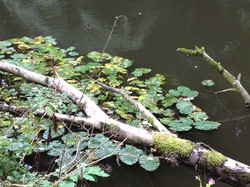 One of the strange things about being here is that information isn't over saturated. For example, there aren't a thousand photographs of the River Lagan nature preserve that I walked through this afternoon. I would likely have never been able to find the entrance (which is within walking distance of my apartment) without someone telling me where it is. So one of the things I'm doing right now is expanding the digital presence of something that is currently under-represented on the internet. There's some official website for where I went, but nothing informal that reviews it. The conversation happening there seems to be about how considerate bikers should be. Initially, expanding the profile of the lovely spot seems like a good thing. For example, if some tourism or ecology board in the UK googled how many hits that the River Lagan has, mine could drive up traffic, leading to an increase of funding for a relaxing and ecologically interesting area. But an increase in traffic and tourism can also have drawbacks. The scent of rotting, I noticed near some muddy peat, is different here than the wetlands around Nashville, or the Everglades of my childhood. Nashville's rotting smells of sulfur, of something slightly disgusting. South Floridian dying vegetation comes to my memory as a brackish smell of salty standing water. I recall it as tepid. Here, there wasn't much of the smell of rotting matter, even though leaves were all over, but when I stood near the gathered heap of moss, leaves, and flowers in mud and water, I could only feel it smelled sickly sweet. It made me walk back and smell again. The trail I walked is an old towpath for a river and lock system that shipped goods through Northern Ireland. But now it's just a interconnected series of paved sidewalks, trails, and deer paths. I must have passed by three dozen people on my walk. Almost all of them were old, a large percentage had dogs, and a handful had strollers. I couldn't believe this level of activity. Even in Central Park, the most high frequency park I've ever attended, all the visitors were tourists or locals walking quickly to get somewhere. There are far more people in New York City than Belfast, but percentage-wise, they just don't show up on a random afternoon to relax and walk their dog. In the Botanic Gardens, a larger and more centrally located Belfast park, I also hadn't seen so many people considering how accessible it is. That may change when undergraduates return, considering how close it is to campus. I suppose the difference between the path I was on today and the two more urban parks I've mentioned is in some sort of cultural difference. But I can't quite pinpoint it. When I tried cycling across Belgium, I found myself on many towpaths. But I don't think I ever saw a soul on them. And the weather was far better there. I think that people here know they have to get out and stay active or they'll get depressed in the winter. This is still technically the last few days of summer, though it doesn't look or feel like it to me. Today I could really feel the latitude of the island. I felt like if I squinted into the distance, I might be able to see sailors coming a-viking from the sea. Halfway through the walk, I found myself heading over a footbridge onto a little island with some mighty trees. I know very little about kind of tress, having grown up surrounded by two kinds--pine and palm--but I wanted to call these birch, or fur, or oak. I know they're not oak trees, but they felt like it. They surrounded me as I wound my way through the undergrowth on paths that I suspect would be good for birdwatching. In the trees I saw a few boxes that I assumed were handmade birdhouses. I kept worrying that I had gone the wrong way. I've walked a significant amount of trails in the hills around middle Tennessee. They were all marked. Some with signs, some with marks of paint on the tree. But here I kept seeing paths split off with no explanation, or drop down to the river or a stream even. But I kept going. I knew the area was well trod, I had a phone, and I felt I could remember my way back if I had to return. At the end of my walk (but not the end of the trail), I came to a little pub across a footbridge. I'm told it's about halfway to Lisburn here, and I didn't stay long. The wind started to pick up around the bridge and a gate that led down to a dock kept slamming open and closed in the gusts. I saw one gate strewn on the ground, broken already. 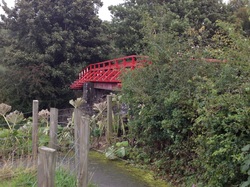 I'm not sure why the bridge was red. I don't think that ships big enough to harm the bridge could even make it this far up the Lagan. And even if they could, I feel like the bridge is high enough and visible enough to avoid damage. The bridge, unlike everything else, didn't really blend into the surrounding area. I wasn't quite sure what to make of it, so I stood on it. From there I could look down into the water, or look down onto the dock, or hear the wind whip a gate. A man with a dog walk past me. The dog seemed like he knew to keep left. The new bridge was just stacked on top of the old one. Perhaps it was red because cyclists were meant to hop off their vehicles and walk them through. But I doubt they could have ridden them across the narrow walkway even if they wanted to. Certainly not with people coming or going. In Florida, it always felt like the new thing was stacked on nature. But there weren't any man-made objects to put on top of things. In New York, you either keep things fresh or they get knocked down and replaced. In the South, antiques are venerated. Old mason walls stand at the borders of property lines that may no longer exists. Here, the old things are still used every day for their original purpose. But the context has shifted around them. I couldn't help but wonder who planned this, or if it could even be called a plan. It felt like a nature preserve, but it also preserved a history before there was a nature preserve. I almost stopped at the Lock Keepers, the remnant of the old canal lock system here, for a drink. Just to see what it was like. But the day was fading and I didn't feel like walking at night.
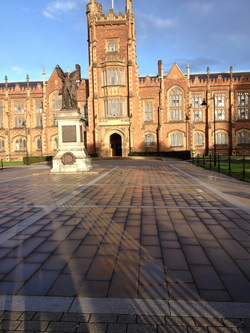 Actually, this is the Lanyon building, a grand old hall in the style of Harry Potter, etc. I don't actually work in that building. I work just up the street from it.
But it's lovely inside. I don't want to spoil the mystery of it by posting images. You'll have to come and see for yourself. Where do I actually work? It's just left of the frame. I work in a row of Georgian houses, that are actually lovely in their own way. My office is on the top floor of one of the row houses, and I look out on a construction site and a street. Today the weather was fickle and windy, and I watched the skies change over the campus. Here's another picture before I go (my office is juuuust to the left out of the frame): Here's an article on architecture and literature that I want to discuss. So I've been considering the connection of architecture and literature for the past two years or so, and I have to say that I love this idea. Taking a plot and trying to plot a building that represents it is a brilliant idea. But I have to say I'm a little disappointed with the architecture that these people came up with. They're very intelligent and modern, don't get me wrong, but they just don't feel exciting or real to me. I have a very difficult time imagining people doing activities, or living, or working, or breathing in any of these buildings. See the piece below for an example. I think what I have in mind is something like the final sequence of Indiana Jones and the Last Crusade, as Indy reads his father's notes and dodges traps based on his allegorical interpretation of a Medieval Literature Professor's cryptic notations on something or other. You know, like this:  I don't want to make the claim that the fine folks in the Architecture and Literature Class at Columbia should try and make their work more crowd-pleasing or anything. I'm not even saying their work isn't fun. I had fun looking at them and thinking about how they represent works of literature. I guess I just feel like they miss out on a little oomph. They don't feel like they're actually building something for entertainment or function. I guess what I'm saying is that the pieces look like great models or plans, but I don't know if I would ever visit the places they are. Contrast that with the Frank Lloyd Wright living room or the Gubbio Studiolo at the Metropolitan Museum of Art* (those example are old, but there are plenty of more recent examples too!). Those places are fun to walk through. I want to sit down in them. I probably would have, in fact, if they didn't put a railing so I couldn't.
But maybe that's the difference between a plan or a plot and a room or a book. Maybe some of these things will come out great in a way I could never have predicted. I hope they all get constructed so I can find out. *[I didn't look it up, but these were perennial exhibits when I used to walk over to the Met every other weekend. I hope they're still there!] Eventually I'll post some live pictures of my beautiful surroundings. Maybe tomorrow. But the business is too overwhelming and the weather is too good to pass up and take pictures. I'm not from here and even I know that sunny days are rare. You can't really capture a sunny day (or trade it in for something else).
As for the business end of things, I'm not talking about the work I'm doing. That's great. I'm talking about the habits of everyday life. It's been a difficult process getting settled. I still don't have a phone of my own and I only now have a bank account. Razor blades and shaving cream are in a different store than my food, and the gym tried to deny me membership for paying in cash. The bank account and phone in particular are an inverted Kafka-esque nightmare. Supposedly I can buy a pay-as-you-go phone somewhere, but they never seem to have them where I want them or where I am, at least not at a reasonable price. I can order one online and that seems simple enough, but when I try and make the order happen I need a bank account. When I try and get a bank account, I need proof of residency. Proofs of residency include utility bills or require a phone number. So that means to get a phone I need to pay utilities to get a bank account. Happily, I found the student union bank will take care of me, but even they require me to wait two days in order to get a basic account. Then I need to wait three months to get a full "real-person" account. This isn't bureaucracy. Bureaucracy is the sort of monster that draws everything into it. It pulls you down into hell. I feel like this is quite different. I'm on the outside of a wall trying to get inside so I can enjoy the basic comforts of the modern world. I'm sure it will all resolve as I persevere. But it makes me feel the fact of my migrant legal status, that I'm an immigrant, or a wanderer. It's confusing and painful and slow and repetitive and confusing again. And it's almost worse when someone condescendingly explains to me how everything works, as if I should have just known what was going on all along. It's not that people here are unfriendly. Quite the opposite. It's just that, like myself and everyone I've ever met, there are holes in perception that make sense to them and not to me. For young Americans these things are taken care of in study abroad, I imagine, but for an old man like me I'm more or less left to my own devices. And my devices are often faulty. This kind of learning is like muscle memory. I'm glad I have a nice place to live while I sort it all out. Many immigrants and citizens don't. And that's an appropriate thought for my first rainy night in Ireland. Today is Labor Day in the United States, a monument to a mighty tide of socialism from a bygone era. It is somehow appropriate then, though I'm not exactly sure how, that I begin my labors today. A meeting in the morning and a meeting in the afternoon, sandwiched between administrative duties like finding out how to get in buildings, which buildings I want to get in, where these buildings are, and how to send and receive emails. Having taken care of these things, I also began in earnest to write and revise.
Write and revise. Write and revise. The first version of my last entry was a mess because of jet lag and emotion and lack of editing. Blog posts aren't meant to be polished essays, prepared over years, but I think a good balance means writing in an explosion in the morning and then polishing it up at night before bed. Write and revise is a phrase I will repeat often, because it is the description of a good chunk of the rest of my career if I am to achieve any degree of success in academia. But the real fun part is the sharing and discussion that happens. Today I met several of my colleagues, whose work and wisdom will hopefully appear in many more of my updates. I am a newly minted Ph.D., and though I do not feel inferior or ignorant in comparison to them, I am cautious about a lack of experience--both in general and in the United Kingdom's university setting. That being said, I've already received an article relating to my research from one colleague, and it can be found here. The author links architecture, specifically urban planning, to the rise of Cartesian philosophy, using examples drawn from Descartes' life. I think the general trend is correct. Rene is a part of a broader movement that wasn't simply a break from the past, and his philosophy reflects a push to fit imaginative systems into the landscape. Our philosopher pal also incorporated elements of architecture into his geometric reasoning. One key observation the author makes but doesn't make enough of in my opinion is the way that "I think therefore I am" requires a basis of doubt. Descartes seems to proceed to certainty from that doubt, which is certainly possible, but only by dwelling in doubt can Descartes achieve his design of a rational philosophy. Plans, I think, are a narrative and imagistic representational tool that require doubt, that require multiplicity. I'm fastening on that doubt and seeing what happens. Maybe it sticks around in ways DeCI look forward to working through this thought as soon as I can to see how convincing it is. |
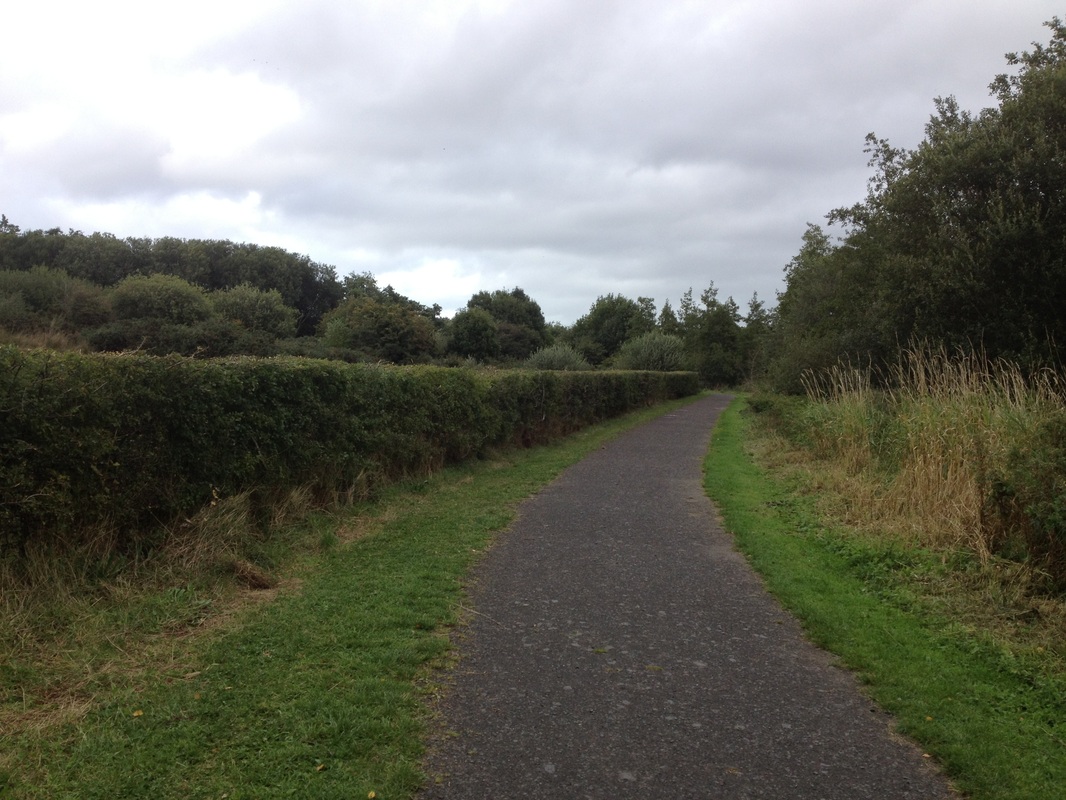
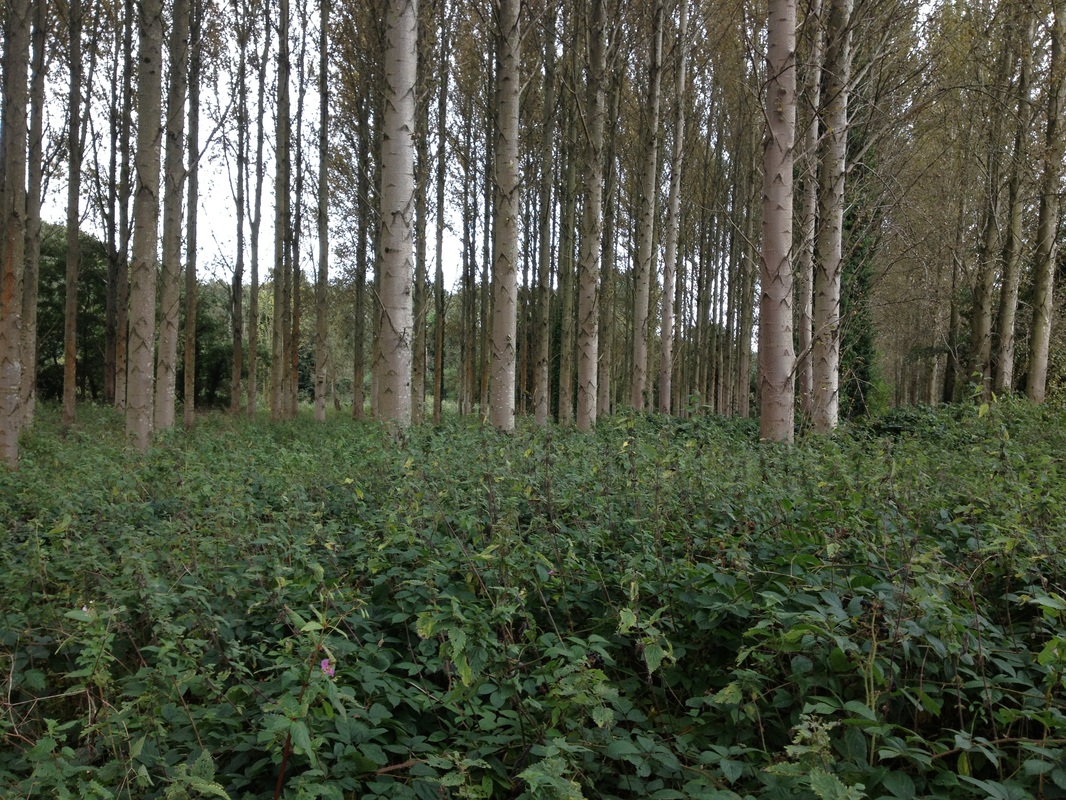
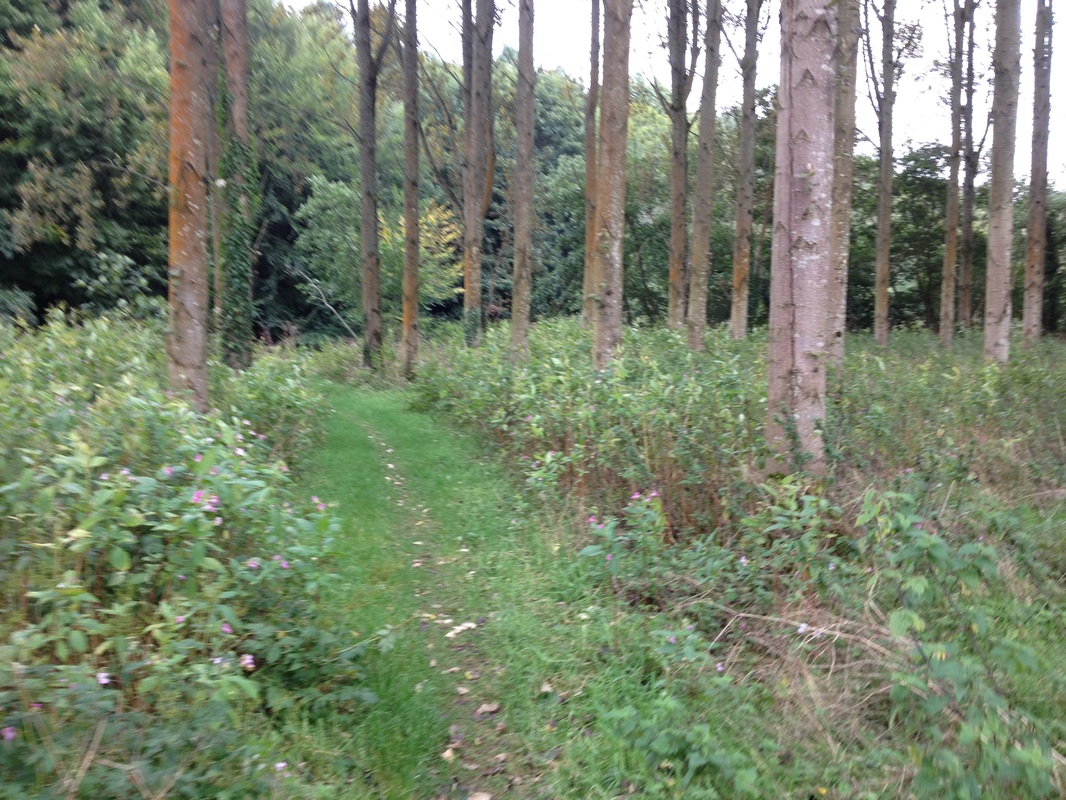
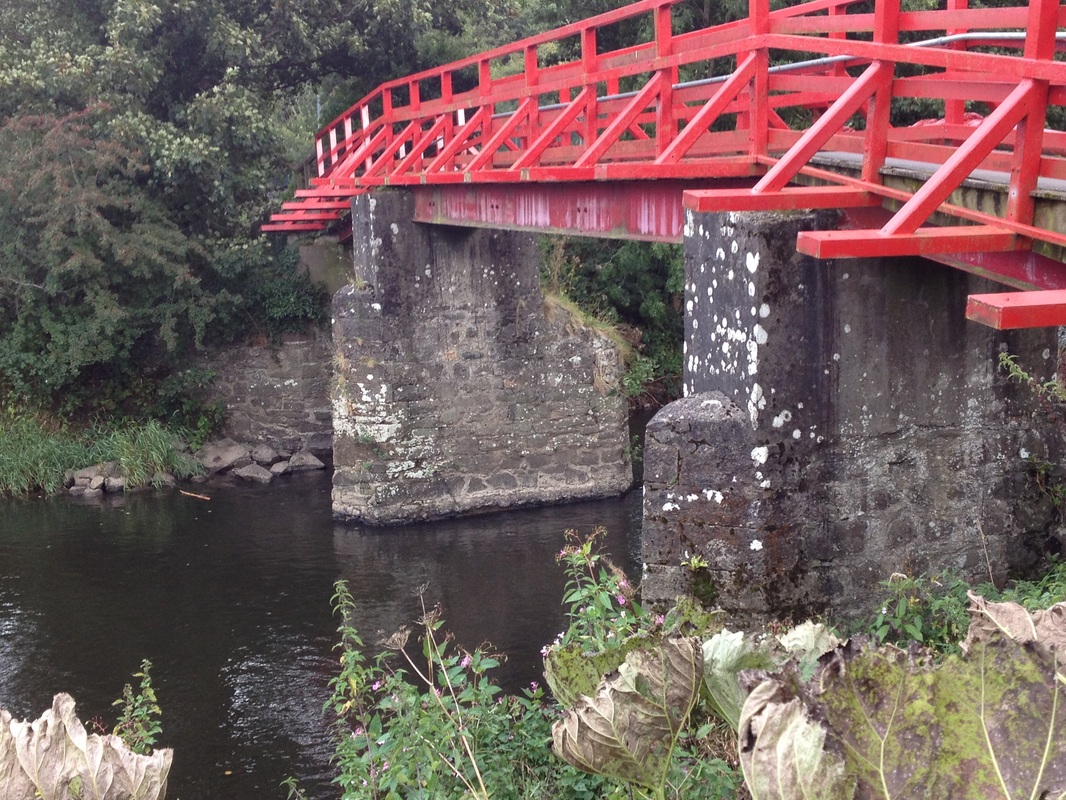
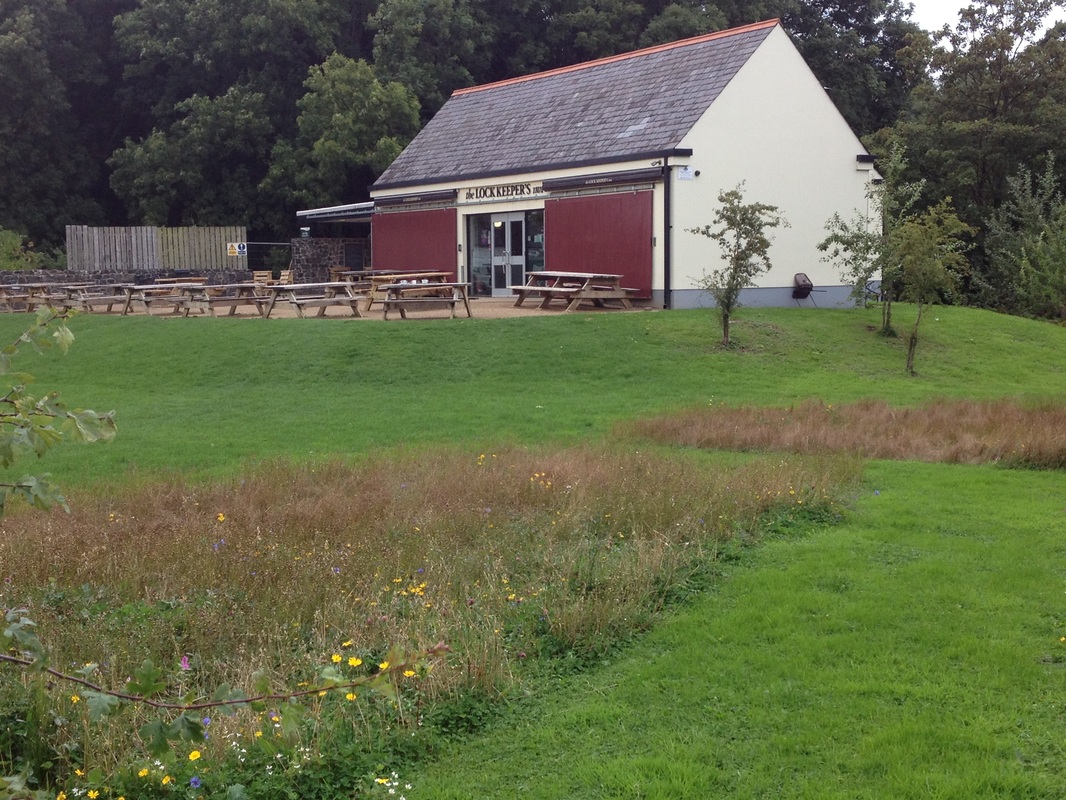
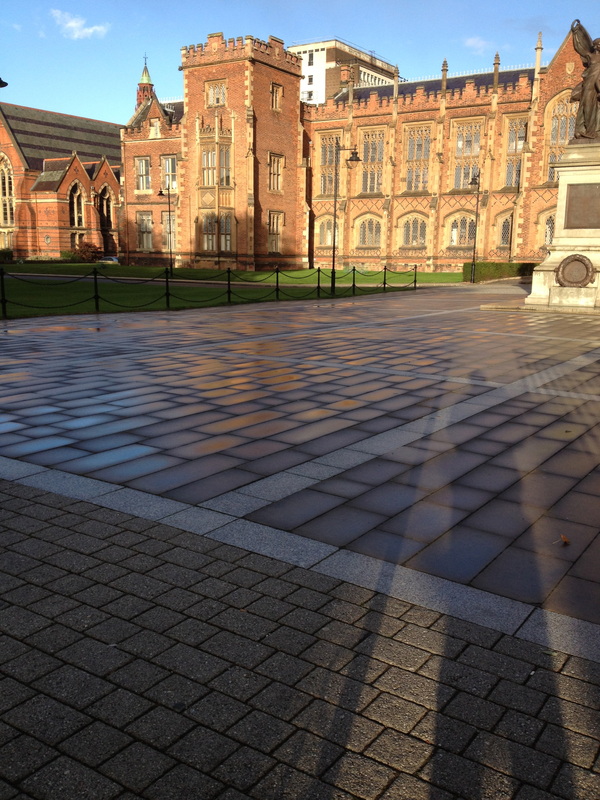
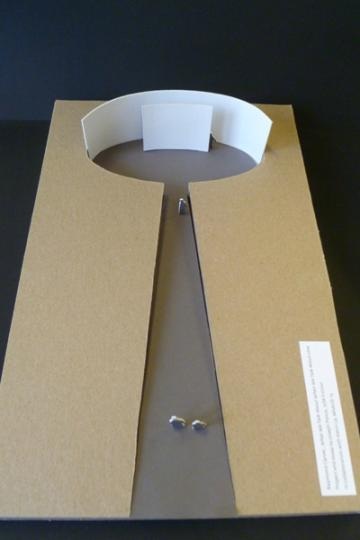
 RSS Feed
RSS Feed